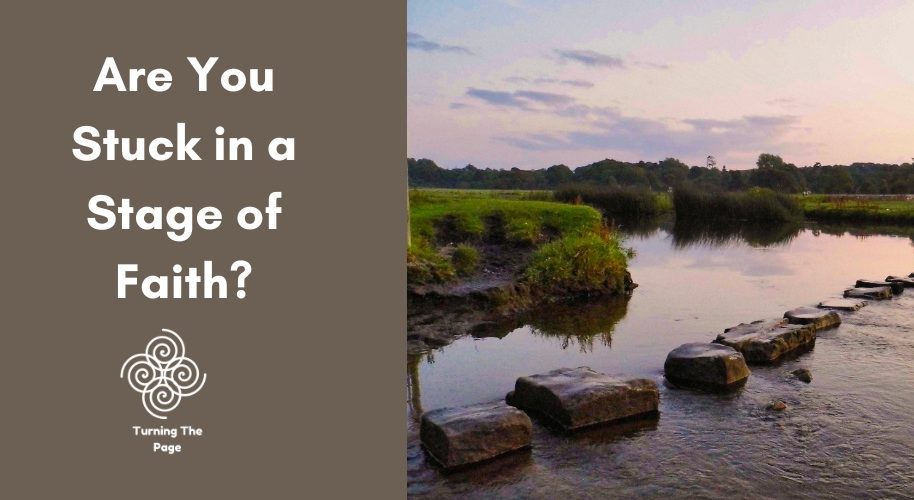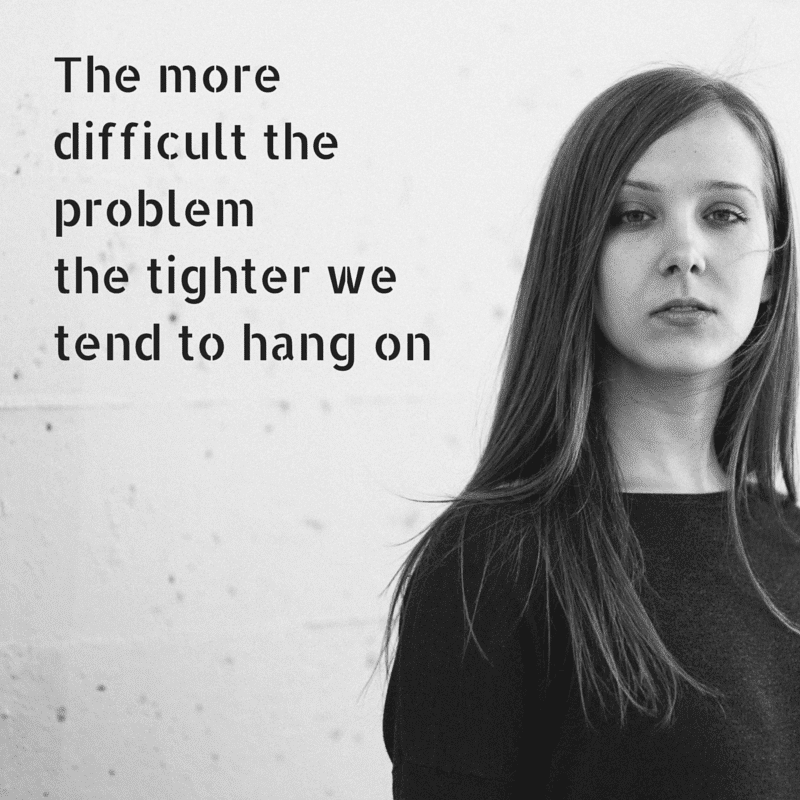They were stuck. Stuck in a Stage of Faith, but with help and gentle curiosity, they were able to take that next step towards wholeness.
It was like the someone had turned on the lights in their thinking. They looked at me in absolute shock while I was explaining some very simple theological concept.
By the way, don’t be afraid of the word ‘Theology’. It simply means how we talk about God. Everyone has a theology. It’s just how some people talk about God seems to keep them stuck and not in a movement to becoming ‘little Christs’.
For this person, with the lights being turned on, they had come to the Christian faith after being indoctrinated and brainwashed in a cult. They also experienced psychosis.
As we talked over the weeks about faith, concepts of what God was supposed to be like, abuse issues and traumas, they slowly became unstuck.
There was a new lightness to them. Truth was setting them free slowly, millimetre by millimetre.
I’ve seen this happen so many times.
It’s a joy, but it can also be a grief.
Particularly when I discover a person who has been stuck for, say, sixty, seventy years in some beliefs that if met earlier with compassionate care, they would have danced and not being under a lifetime dirge.
I suppose it’s why I do what I do.
Then their eyes were opened
You don’t know what you don’t know. Read that sentence again.
There are things that you don’t know, and that if you actually knew and adopted into your life, they might transform some of the deepest regions of your heart.
Explosive ideas that could radically change everything.
I think of those early followers of Jesus stuck in a moment of confusion following the crucifixion and then the resurrection of Jesus.
Two of them, while walking back to Emmaus, have a stranger come alongside them that explains things to them. This stranger asks them deep and gently curious questions that explore where they are stuck.
They stop for a meal and then they recognise that this is Jesus.
When he was at the table with them, he took bread, blessed and broke it, and gave it to them.
Then their eyes were opened, and they recognized him; and he vanished from their sight. Luke 24:30-31
Stages of faith
Recently I watched an interaction between a five-year-old and her father.
The father was clear, firm, and direct about what she could and couldn’t do.
He said it with a gentle, loving directness that conveyed good authority. She respected the tone and instructions. It was beautiful to watch.
I wondered about how this communication might look in ten years’ time when the little girl would be fifteen.
I don’t believe it would be the same. I think the relationship would change to one of discussion, advice, an encouragement to make one’s own choices, to consider consequences.
One of the most fascinating papers I did in my theology degree was about Stages of Faith.
We primarily studied the work of James Fowler.
A summary of his Six stages of faith is below.
- Stage 1 – “Intuitive-Projective” faith (ages of three to seven), is characterized by the psyche’s unprotected exposure to the Unconscious, and marked by a relative fluidity of thought patterns. Religion is learned mainly through experiences, stories, images, and the people that one comes in contact with.
- Stage 2 – “Mythic-Literal” faith (mostly in school children), is characterized by persons have a strong belief in the justice and reciprocity of the universe, and their deities are almost always anthropomorphic. During this time metaphors and symbolic language are often misunderstood and are taken literally.
- Stage 3 – “Synthetic-Conventional” faith (arising in adolescence; aged 12 to adulthood), is characterized by conformity to authority and the religious development of a personal identity. Any conflicts with one’s beliefs are ignored at this stage due to the fear of threat from inconsistencies.
- Stage 4 – “Individuative-Reflective” faith (usually mid-twenties to late thirties), is a stage of angst and struggle. The individual takes personal responsibility for his or her beliefs and feelings. As one is able to reflect on one’s own beliefs, there is an openness to a new complexity of faith, but this also increases the awareness of conflicts in one’s belief.
- Stage 5 – “Conjunctive” faith (mid-life crisis), acknowledges paradox and transcendence relating reality behind the symbols of inherited systems. The individual resolves conflicts from previous stages by a complex understanding of a multidimensional, interdependent “truth” that cannot be explained by any particular statement.
- Stage 6 – “Universalizing” faith. The individual would treat any person with compassion as he or she views people as from a universal community, and should be treated with universal principles of love and justice.
wiki/James_W._Fowler
Apologies for some of the words used. Perhaps I will have to create my own version of stages.
Have a considered look over the stages and see where you might be.
There are others who have explored this topic, such as Scott Peck and Brian McLaren
Stuck in a stage
Often I find, with people who come to Turning the Page, is that many are stuck in a stage.
They are like the little Five-year-old girl still seeing God as being a firm, authoritative, harsh supreme father, yet they are in adult bodies.
They are stuck.
They are stuck, I believe, for three reasons.
- They were traumatised (big trauma or small trauma) at an early stage in their faith development and they linked that trauma to what God was like. These beliefs formed into rock solid neural pathways in the brain.
- They stayed in faith communities (Churches, small groups) that kept reinforcing those same beliefs. Directly or indirectly, any exploration outside of those beliefs was frowned upon, and even a possible expulsion was threatened if they dared step out of line.
- There has been no ongoing mentoring or spiritual direction from someone who has gone through the stage that is being faced.
So, in the internet’s anonymity, they type in the questions of the heart into search engines.
They open themselves to both what is old and familiar (that reinforces their beliefs) and possibly some new ideas that seem strange and possibly against everything they have held to be true.
They seek mentors and spiritual directors who seem to have freedom in themselves. Books are read, videos are watched, and podcasts listened to.
Slowly, they become less and less stuck. They surrender to a change being offered and adopt new beliefs and constructs about who God is and what God is up to in the world.
Their faith walk is no longer steps of boring rigidity, but it evolves into a musical dance of joyous generosity.
Their eyes have been opened and they can’t unsee what has been seen.
Questions?
Comments?
Email me 🙂📨
barry@turningthepage.co.nz
Give a little gift to keep the pages turning
Quotes to consider
-
Every Christian is to become a little Christ. The whole purpose of becoming a Christian is simply nothing else. Mere Christianity
- Faith is not the clinging to a shrine but an endless pilgrimage of the heart. Abraham Joshua Heschel
- Faith is not the opposite of doubt. Faith is the opposite of certitude. Where you don’t need to be certain to be happy. If you can’t go there, you’ll never be happy because you’ll never get logical certitude. If you’re waiting for 100% certitude you’re never going to be happy. Richard Rohr. Podcast: Trust is a Rock You Can Build Upon
- A good journey begins with knowing where we are and being willing to go somewhere else. Richard Rohr
- The great traditions always call people on a journey of faith to keep changing. There’s no other way this human personality can open up to all that God is asking of us. Richard Rohr https://cac.org/daily-meditations/keep-changing-2023-02-20/
- Conventional Christianity (of many different denominations) prefers to see Jesus as a directive or destination rather than this path; for them “way” is a noun, not a verb. On the mapless journey, however, all is movement. There is no destination, only the enveloping presence of love. Diana Butler Bass https://cac.org/daily-meditations/a-mapless-journey-2023-02-23/
Questions to answer
- When have you had a ‘lightbulb’ experience where you have learned something new and everything becomes clearer?
- What ‘Stage of faith’ do you think you are in? What stage of faith is your faith community in?
- How do you think trauma informs one’s understanding of what God is like?
Formation exercise
- Journal about how your journey of faith has gone through various stages.
Further reading
Explore these Tags
Barry Pearman
Photo by Lisa Baker on Unsplash





